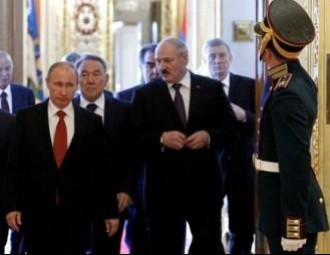The basics of the Eurasian Economic Union

The union which Moscow had pushed Ukraine to join, helped and lied at the core of the worst crisis in Russia-West relations since the Cold War, writes Vladimir Isachenkov.
The leaders of Russia, Belarus and Kazakhstan on Thursday created an economic union that intends to boost cooperation between the ex-Soviet neighbors, a pact which was at the source of the crisis in Ukraine.
Russian President Vladimir Putin said the Eurasian Economic Union — which Moscow had pushed Ukraine to join, helping spark the worst crisis in relations between Russia and the West since the Cold War — takes the countries' cooperation to a "new level" while respecting their sovereignty.
"We are creating a powerful and attractive center of economic development, a major regional market bringing together over 170 million people," Putin said during talks in Kazakhstan's capital, Astana. He added that the pact would allow the countries to exploit their economic potential and strengthen their positions in global markets.
The alliance is the development of the Customs Union including the same nations. In addition to free trade, it coordinates the members' financial systems and regulates industrial and agricultural policies along with their labor markets and transport systems. The deal stops short of introducing a single currency and delays the creation of a common energy market.
The signing followed years of tense negotiations, and many differences have remained.
Moscow will host the top executive body of the new alliance. Its high court will be based in Belarus, and the top financial regulator will be located in Kazakhstan.
Belarus' authoritarian President Aliaksandr Lukashenka, who has depended on cheap Russian energy and other subsidies to keep the 10-million nation's Soviet-style economy afloat, said before the signing he wasn't fully happy with the deal, but hailed it reflected a mutually acceptable compromise.
Kazakhstan, led by autocratic President Nursultan Nazarbaev, is the second largest country by territory and economy among the ex-Soviet nations. Nazarbayev has maneuvered between Russia and the West during more than two decades in power. But Russia has little leverage over Kazakhstan, whose energy riches and booming economy make it an equal partner.
Nazarbaev said the new pact is based on consensus. "The agreement is well-balanced and thorough, taking into accounts the interests of all its members," he said.
He voiced hope that the new alliance "will become a powerful incentive for modernizing our economies and helping making them global leaders."
Armenian President Serge Sarkisian said that his nation will be ready to join the pact as early as next month after completing final preparations. Kyrgyzstan said it hopes to join the Customs Union, the precursor to the new alliance, before the year's end.
Russia tried to have Ukraine join the integration project and spike an association agreement with the European Union. But Ukraine's pro-Russia president, who spurned the deal with the EU in favor of closer ties with Moscow, was chased from power in February following months of protests. Russia then annexed Ukraine's Black Sea peninsula of Crimea, and a pro-Russia mutiny has engulfed eastern Ukraine, where rebels have seized government buildings and fought government troops.
The United States and the European Union have responded by slashing travel bans and asset freezes on members of Putin's entourage, and threatened to introduce further sanctions if Russia further tries to destabilize Ukraine.
Originally published on ABC News
-
03.01
-
07.10
-
22.09
-
17.08
-
12.08
-
30.09








































